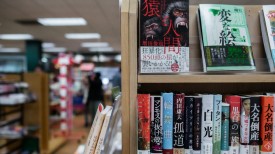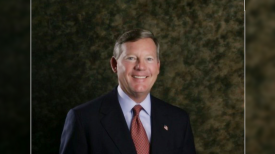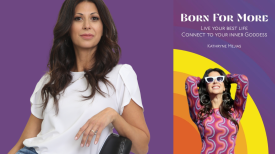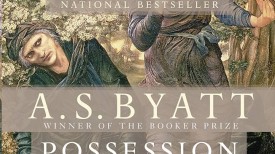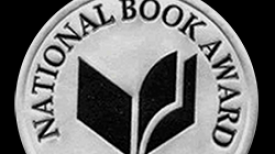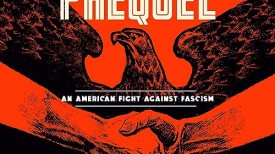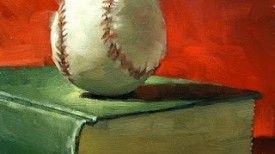The Romancing Of Julia Quinn: ‘A Night Like This’ Author Talks Genre, Critics, ‘Downton Abbey’
Author Julia Quinn has made a name for herself with her funny, quirky stories -- adjectives not commonly used to describe historical romance novels.
But Quinn, like many of her fellow romance writers today, is not cut from the same cloth as some of the romance authors of decades past, who often wrote books in which the male leads routinely mistreated female heroines. The author of popular romance novels such as "On the Way to the Wedding" and "What Happens in London" takes a lighter, more humorous approach, and this is in part to her upbringing. She admits to having a "goofy family." Her dad, for example, went so far as to sing on an amateur talent contest television show when Quinn, 42, was still in grade school. She also participated in scripted family home movies. One production required her to play a "deranged killer" who yelled "No more birthday parties" (more of this later).
Now the Romance Writers of America Hall of Fame member -- whohas three prestigious RITA Awards under her belt (think the Oscars of romance writing) -- is coming out with the next book in her Smythe-Smith Quartet, "A Night Like This," which will hit bookstores on May 29.
In a funny and revealing interview with International Business Times, Quinn talked about the romance genre, took its critics to task, and gushed about "Downton Abbey."
What do you like about your "A Night Like This" female lead, Anne Wynter?
I just like that she's so strong inside. Until the time she was 16 she lived a fairly privileged life. Something happened and she had to be completely on her own. She was bewildered and stunned and upset and didn't think she would be able to make it, but she does. I like her strength and her ability to maintain a sense of humor.
As an author, what is your biggest challenge?
The biggest challenge of my career, which is something that authors of genre fiction face all the time, is writing something fresh and new and at the same time meeting reader expectations. When somebody picks up one of my books they have a certain expectation. Certainly not every reader has liked every one of my books but I think that's a good thing because it means I'm not repeating myself.
What's your writing process like?
I end up spending quite a lot of time working out a summary of what I'm going to do. It covers the plot of the book but more importantly it covers the characters -- who these people are and what happened to them before the book opened. These are the experiences that have shaped them. There may be information that never comes out in the book. I think it just helps me create a more three-dimensional character. The process of doing these outlines really takes a while, which sometimes surprises me. When I do start writing the actual book I go mostly chronologically and I also edit as I go along.
How long does it take you to finish a book?
Not including the outline part, four to six months.
What advice do you have for aspiring writers?
The thing that would work for anybody is read. Specifically, read in the genre you're interested in. There are people who say they want to write novels. They think "I'll learn my craft on the romance novel." If you don't love the genre it's going to show and it's not going to be a good book.
What about aspiring romance authors?
Join Romance Writers of America. It's just an incredible resource. You get a monthly magazine. You get to join a local chapter which, especially for a beginning writer, is so important. I almost always go to the national conference. It's a nice way for me to connect with other people who do what I do.
What's your advice on writing dialogue?
Read it out loud. If you're not sure whether your dialogue sounds natural read it out loud and you'll know almost instantly.
Which negative comment about the romance genre irks you the most?
People refer to them as trashy romance novels. Most people who call them that are not meaning to be derogatory. These are often women who love to read them. Whenever they say it I'm like "They're not trashy, they're entertaining." They say it with affection so you can't be too mad but it's a descriptive I'm not fond of.
Critics of the romance genre say that it gives women unhealthy ideas about relationships. What do you think of that?
I think it's funny. What does that say about murder mysteries? Do we now think that every murder is going to be solved? What about spy thrillers or novels where people have sex and then that's it? That's healthier? I just don't understand how a novel where the ending is two people committing to a long-term, monogamous relationship is unhealthy. I think for quite a lot of people that is a goal and that is something they would like. Whenever I read articles where critics are saying that, the books they are citing as having read are all from like a decade or two ago, or more, and the genre has changed dramatically. So I'd like someone to do their due diligence. There used to be a lot of rape fantasy elements but you'd be very hard pressed to find that now. But critics still go back to that. My characters wouldn't stand for that.
Your male lead characters are certainly very kind and loving.
I keep trying to write a bad boy and they always come out nice. I don't see the appeal of someone who is going to demean me in some way.
If you could be one of your heroines, who would it be?
I guess Penelope from "Romancing Mr. Bridgerton" because she's really true to herself.
What if you could meet one of your heroines? Who would you choose?
I'd have to say Hyacinth from "It's In His Kiss" because she's such a piece of work. I don't think she's the one I'd be best friends with, but I just want to meet her. I just think she'd be a hoot.
Tell us about your dad's appearance on "The Gong Show."
My dad, Steve Cotler, who is also an author, appeared on "The Gong Show" when I was seven. His brother was actually the one who was supposed to go on, but my uncle is a professional musician -- he later won a Grammy for co-writing one of the songs on the movie soundtrack for "Flashdance" -- and he thought that a "Gong Show" appearance would sully his professional reputation. He didn't want to leave the show high and dry, though, so my dad, who apparently had nothing better to do, decided to take his place. My dad, however, didn't want to sully his professional reputation -- he has a Harvard MBA and had recently worked in the corporate world -- so he gave them a fake name and told them he was an Argentinian bank guard. He sang a Tom Lehrer song called "I Hold Your Hand in Mine." This all happened when I was in second grade. I am eternally thankful that he didn't do this when I was in high school. I would have been scarred forever.
That's hilarious! What other funny things went down in your family?
The other thing about my childhood that is relative to writing and humor would be the early home movies. We were one of the first families to get a video camera. The rule was that if you wrote a script, everyone else had to be in it, in the roles you chose. This might explain how I ended up cast as a deranged killer yelling "No more birthday parties!" in "Don't Wait for Judy." My stepbrother wrote that one. For my opus, a melodrama called "The Will of Phaedra," I naturally played the cute, popular younger sister of the villain.
Speaking of television, are you keeping up with any shows?
I keep waiting for the day in which everyone who loves "Downton Abbey" will realize they were actually watching a historical romance novel. That what's "Downton Abbey" is and I can't wait for season 3! I just love everything about it. You're rooting for the couple to finally get together. It's everything I've always loved about historical romances on the screen.
Contributed by International Business Times
© 2023 Books & Review All rights reserved.
Popular Now
1
Books to Read After 'Fourth Wing': Top Picks for Fantasy and Romantasy Fans

2
‘The Secret Public’ by Jon Savage Book Review: An Insightful Look Into the LGBTQ Influence

3
Stephanie Regalado's 'If They Only Knew' Column Is Now A Book, Unleashing 60 Anonymous True Stories to Empower Women

4
'No Wire Hangers' Scene That Almost Did Not Happen: New Book Reveals Faye Dunaway's Struggles

5
Rare First Edition of Aphra Behn's Novel 'Oroonoko' Discovered in Kent: A Historic Literary Find

Latest Stories
Book Reviews
‘The Secret Public’ by Jon Savage Book Review: An Insightful Look Into the LGBTQ Influence

Book News
Stephanie Regalado's 'If They Only Knew' Column Is Now A Book, Unleashing 60 Anonymous True Stories to Empower Women

Book News
'No Wire Hangers' Scene That Almost Did Not Happen: New Book Reveals Faye Dunaway's Struggles

Book Reviews
‘The Perfect Couple’ by Elin Hilderbrand Book Review: A Captivating Summer Mystery

Book News
New Book ‘The Franchise’ Reveals Penguins President Kyle Dubas’ ‘Biggest Mistake’ as Maple Leafs GM

